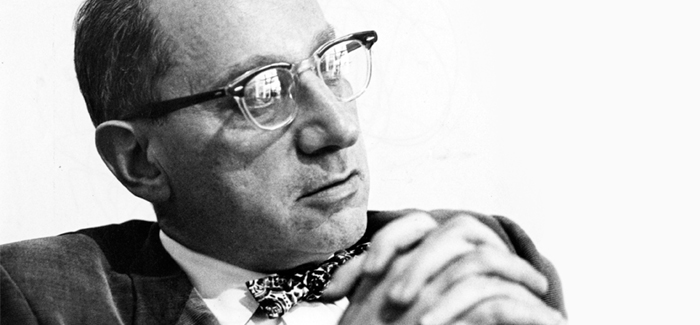
Levi weighed the necessity—and necessary limits—of electronic surveillance. (Photography by Chicago Maroon, Archival Photographic Files, apf7-00664, Special Collections Research Center, University of Chicago Library)
As attorney general after Watergate, UChicago’s Edward Levi worked to restore a nation’s trust.
In the winter of 1975, UChicago president Edward Levi, U-High’28, PhB’32, JD’35, left Hyde Park for Washington, DC. The Watergate scandal had emptied offices all across the capital, and Levi, who’d spent nearly his whole life and career at the University of Chicago, was going to fill one of them: Gerald Ford had appointed him attorney general, charged with restoring order to a battered and besieged Justice Department.
It was not an easy job. For one thing, says UChicago trustee Jack Fuller, who served as Levi’s special assistant in Washington, the poisonous political atmosphere Levi walked into can hardly be overstated. “It was so unbelievably ugly,” Fuller says. Nixon Administration officials were being indicted and jailed one after another. Throughout the country, corrosive rage and resentment had taken hold. People no longer trusted their government.
Levi spent only two years in Washington before returning to campus and resuming his academic life, but he left an enduring mark on the attorney general’s office. Most famously, he established a series of guidelines for electronic surveillance and domestic security investigations, which had previously gone mostly unregulated. But he also discussed before Congress and the public governmental decisions and deliberations—and abuses—that had gone undisclosed before. “He understood that bad things happen in the world, and that when those such things happen, nations adapt,” Fuller says. “But he had a very, very, very strong inclination to expose the nature of the choices to the public in clear ways. It wasn’t that he didn’t appreciate the need for secrecy.” Levi had served in the Justice Department’s war division during World War II. “He was sensitive about these matters, but he would push the envelope in the direction of fairness.”
Levi’s envelope-pushing openness is unmistakable in Restoring Justice (University of Chicago Press, 2013), a compilation of his speeches. Edited by Fuller, a Pulitzer prize–winning reporter, editor, and later publisher of the Chicago Tribune, the book focuses mostly on speeches about trust in government, the rule of law, security, and individual freedom—“lively issues again and again,” Fuller says. The book, he adds, offers a reminder “that people can speak with intellectual honesty and some sophistication about very difficult things, decisions that governments face, and that it’s actually important to do so in an open society.”
Addressing bar associations, academic gatherings, Congressional committees, FBI Academy graduates, and bicentennial celebrants, Levi talked about the tension between privacy and security, between press freedom and state secrets. He discussed the failures of the juvenile justice system and the federal government’s limited power to fight crime. He offered a complex and nuanced view of the separation of powers. Speaking to new American citizens at a swearing-in ceremony, he said, “The Constitution was born with many doubts. It was not claimed to be perfection. Unlike the Articles of Confederation, it provided for a process of amendment. The Constitution arose out of a view of life, of society and private associations, of political action. That view recognizes that individuals and groups will disagree, in accordance with the diversity among them.”
And time and again, before diverse audiences, Levi discussed electronic surveillance and the difficult and compelling considerations on all sides of the issue, including the limits and demands of the Fourth Amendment protections. One of the most striking speeches in Restoring Justice is a 33-page testimony delivered in November 1975 to a Senate select committee, laying out the legal framework for electronic surveillance. It was a remarkable speech, Fuller says, “exposing the reality of this practice and the legal setting going back to the British origins of our common law.”
At that time, there was no statute governing electronic surveillance, and Levi was signing authorizations himself to allow the FBI to conduct wiretaps without a warrant, including break-ins to install microphones. “And courts were beginning to question whether any of it was constitutional,” Fuller says. It was a legally vulnerable time. “You couldn’t just stop doing this electronic surveillance,” he adds. “I mean, there really were spies. It was a hard world out there, the Cold War was still going on, and it was real.”
So, too, were the abuses of authority for which government officials were going to jail. “But when Edward got up there, he didn’t just give a ringing statement about why there was presidential authority to do this.” He also described the problems with electronic surveillance and why the law had progressed toward restricting it. The Foreign Intelligence Surveillance Act, establishing the FISA court to issue surveillance warrants, was passed in 1978, a year after Levi’s departure.
What might Levi make of our historical moment and the state of government surveillance today? It’s hubris to predict, says Fuller, who was close friends with Levi until his death in 2000. But, he says, “I believe he would have always erred on the side of candidness and exposing the genuine nature of the choices that had to be made. … He really deeply believed in, in an intellectually honest way, explaining what those things were on either side of the balance. And so I think he probably would have done a good bit more of that over the last ten years or so than maybe we’ve seen. He would have tried to.”
Video
UChicago Institute of Politics discussion: Restoring Justice: The Legacy of Edward Levi, April 30, 2013.
